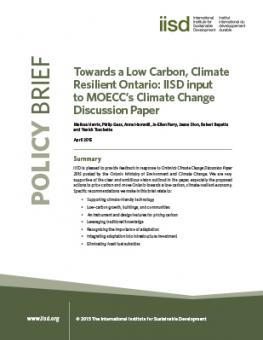
Towards a Low Carbon, Climate Resilient Ontario: IISD input to MOECC’s Climate Change Discussion Paper
The Ontario Ministry of Environment and Climate Change released its Ontario Climate Change Discussion Paper 2015. This brief outlines IISD’s response to proposed actions related to:
- Supporting climate-friendly technology
- Low-carbon growth, buildings and communities
- An instrument and design features for pricing carbon
- Leveraging traditional knowledge
- Recognizing the importance of adaptation
- Integrating adaptation into infrastructure investment
- Eliminating fossil fuel subsidies
IISD recommends a cap-and-trade system for Ontario that covers as many sectors and activities as possible, since broad coverage creates a level playing field for economic sectors and helps ensure that the most low-cost mitigation opportunities are realized. It is integral to ensure that the system is credible and stringent, that monitoring and verification are strong, that there is integrity and that a viable price for carbon emerges in Ontario.
You might also be interested in
Powering the Clean Energy Transition: Net-Zero electricity in Canada
This brief explains how a shift to clean power generation can offer affordable, reliable electricity, benefiting households and businesses alike.
IISD Welcomes Draft Regulations for Oil and Gas Pollution Cap
A firm cap on emissions can provide certainty for industry to invest in decarbonization, while ensuring the sector is on a path to net-zero by 2050.
For Nature-Based Solutions to Be Effective, We Need to Work with Indigenous Peoples and Local Communities
Nature-based solutions have been praised as a promising approach to tackling the twin crises of climate change and biodiversity loss. But some Indigenous Peoples and local communities are questioning the legitimacy of the concept and what it symbolizes. It is time to listen to what they have to say.
How Fossil Fuels Drive Inflation and Make Life Less Affordable for Canadians
New report takes closer look at how Canada’s dependence on fossil fuels impacts energy costs and prices of essentials such as transportation, home heating, and housing.